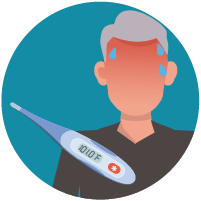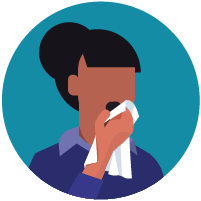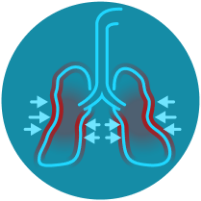Learn More About COVID-19
Coronavirus (COVID-19)
COVID-19 is a new illness that can affect your lungs and airways. It's caused by a virus called coronavirus.
Stay at home if you have coronavirus symptoms
Stay at home if you have either:
- A High Temperature– this means you feel hot to touch on your chest or back (you do not need to measure your temperature)
- A New, Continuous Cough– this means coughing a lot for more than an hour, or 3 or more coughing episodes in 24 hours (if you usually have a cough, it may be worse than usual)
Do not go to a health center, doctor’s office, pharmacy or hospital. Self-isolate immediately and call 888-ONE-LOVE (663-5683).
Symptoms
Watch for symptoms
Reported illnesses have ranged from mild symptoms to severe illness and death for confirmed COVID-19 disease 2019 (COVID-19) cases.
These common symptoms may appear 2-14 days after exposure.
- Fever
- Cough
- Shortness of breath



Older Adults/ Senior Citizens / Elders
Adults, 65 years and older, are at higher risk for severe illness. COVID-19 is a new disease and we are learning more about it every day.
What you can do
If you have a serious underlying medical condition:
- Stay home
- Wash your hands often.
- Avoid close contact (6 feet, which is about two arm lengths) with people who are sick.
- Clean and disinfect frequently touched services.
- Avoid all cruise travel and non-essential air travel.
- Call your healthcare professional if you have concerns about COVID-19 and your underlying condition or if you are sick.
What is a COVID-19?
What is COVID-19?
What are the symptoms of COVID-19?
How does COVID-19 spread?
WHO is assessing ongoing research on the ways COVID-19 is spread and will continue to share updated findings.
Can the virus that causes COVID-19 be transmitted through the air?
Can COVID-19 be caught from a person who has no symptoms?
Can I catch COVID-19 from the feces of someone with the disease?
What can I do to protect myself and prevent the spread of disease?
Protection measures for everyone
Stay aware of the latest information on the COVID-19 outbreak, available on the WHO website and through your national and local public health authority. Many countries around the world have seen cases of COVID-19 and several have seen outbreaks. Authorities in China and some other countries have succeeded in slowing or stopping their outbreaks. However, the situation is unpredictable so check regularly for the latest news.
You can reduce your chances of being infected or spreading COVID-19 by taking some simple precautions:
-
Regularly and thoroughly clean your hands with an alcohol-based hand rub or wash them with soap and water.
Why? Washing your hands with soap and water or using alcohol-based hand rub kills viruses that may be on your hands. - Maintain at least 1 metre (3 feet) distance between yourself and anyone who is coughing or sneezing. Why? When someone coughs or sneezes they spray small liquid droplets from their nose or mouth which may contain virus. If you are too close, you can breathe in the droplets, including the COVID-19 virus if the person coughing has the disease.
-
Avoid touching eyes, nose and mouth.
Why? Hands touch many surfaces and can pick up viruses. Once contaminated, hands can transfer the virus to your eyes, nose or mouth. From there, the virus can enter your body and can make you sick. -
Make sure you, and the people around you, follow good respiratory hygiene. This means covering your mouth and nose with your bent elbow or tissue when you cough or sneeze. Then dispose of the used tissue immediately.
Why? Droplets spread virus. By following good respiratory hygiene you protect the people around you from viruses such as cold, flu and COVID-19. -
Stay home if you feel unwell. If you have a fever, cough and difficulty breathing, seek medical attention and call in advance. Follow the directions of your local health authority.
Why? National and local authorities will have the most up to date information on the situation in your area. Calling in advance will allow your health care provider to quickly direct you to the right health facility. This will also protect you and help prevent spread of viruses and other infections. -
Keep up to date on the latest COVID-19 hotspots (cities or local areas where COVID-19 is spreading widely). If possible, avoid traveling to places – especially if you are an older person or have diabetes, heart or lung disease.
Why? You have a higher chance of catching COVID-19 in one of these areas.
Protection measures for persons who are in or have recently visited (past 14 days) areas where COVID-19 is spreading
- Follow the guidance outlined above (Protection measures for everyone)
-
Self-isolate by staying at home if you begin to feel unwell, even with mild symptoms such as headache, low grade fever (37.3 C or above) and slight runny nose, until you recover. If it is essential for you to have someone bring you supplies or to go out, e.g. to buy food, then wear a mask to avoid infecting other people.
Why? Avoiding contact with others and visits to medical facilities will allow these facilities to operate more effectively and help protect you and others from possible COVID-19 and other viruses. -
If you develop fever, cough and difficulty breathing, seek medical advice promptly as this may be due to a respiratory infection or other serious condition. Call in advance and tell your provider of any recent travel or contact with travelers.
Why? Calling in advance will allow your health care provider to quickly direct you to the right health facility. This will also help to prevent possible spread of COVID-19 and other viruses.
How likely am I to catch COVID-19?
For most people in most locations the risk of catching COVID-19 is still low. However, there are now places around the world (cities or areas) where the disease is spreading. For people living in, or visiting, these areas the risk of catching COVID-19 is higher. Governments and health authorities are taking vigorous action every time a new case of COVID-19 is identified. Be sure to comply with any local restrictions on travel, movement or large gatherings. Cooperating with disease control efforts will reduce your risk of catching or spreading COVID-19.
COVID-19 outbreaks can be contained and transmission stopped, as has been shown in China and some other countries. Unfortunately, new outbreaks can emerge rapidly. It’s important to be aware of the situation where you are or intend to go. WHO publishes daily updates on the COVID-19 situation worldwide.
You can see these at https://www.who.int/emergencies/diseases/novel-coronavirus-2019/situation-reports/
Should I worry about COVID-19?
Illness due to COVID-19 infection is generally mild, especially for children and young adults. However, it can cause serious illness: about 1 in every 5 people who catch it need hospital care. It is therefore quite normal for people to worry about how the COVID-19 outbreak will affect them and their loved ones.
We can channel our concerns into actions to protect ourselves, our loved ones and our communities. First and foremost among these actions is regular and thorough hand-washing and good respiratory hygiene. Secondly, keep informed and follow the advice of the local health authorities including any restrictions put in place on travel, movement and gatherings.
Learn more about how to protect yourself at https://www.who.int/emergencies/diseases/novel-coronavirus-2019/advice-for-public
Who is at risk of developing severe illness?
Are antibiotics effective in preventing or treating the COVID-19?
Are there any medicines or therapies that can prevent or cure COVID-19?
Is there a vaccine, drug or treatment for COVID-19?
Not yet. To date, there is no vaccine and no specific antiviral medicine to prevent or treat COVID-2019. However, those affected should receive care to relieve symptoms. People with serious illness should be hospitalized. Most patients recover thanks to supportive care.
Possible vaccines and some specific drug treatments are under investigation. They are being tested through clinical trials. WHO is coordinating efforts to develop vaccines and medicines to prevent and treat COVID-19.
The most effective ways to protect yourself and others against COVID-19 are to frequently clean your hands, cover your cough with the bend of elbow or tissue, and maintain a distance of at least 1 meter (3 feet) from people who are coughing or sneezing. (See Basic protective measures against the new coronavirus ).
Is COVID-19 the same as SARS?
SARS was more deadly but much less infectious than COVID-19. There have been no outbreaks of SARS anywhere in the world since 2003.
Should I wear a mask to protect myself?
WHO advises rational use of medical masks to avoid unnecessary wastage of precious resources and mis-use of masks ( see Advice on the use of masks ).
The most effective ways to protect yourself and others against COVID-19 are to frequently clean your hands, cover your cough with the bend of elbow or tissue and maintain a distance of at least 1 meter (3 feet) from people who are coughing or sneezing. See basic protective measures against the new coronavirus for more information.
How to put on, use, take off and dispose of a mask?
- Remember, a mask should only be used by health workers, care takers, and individuals with respiratory symptoms, such as fever and cough.
- Before touching the mask, clean hands with an alcohol-based hand rub or soap and water
- Take the mask and inspect it for tears or holes.
- Orient which side is the top side (where the metal strip is).
- Ensure the proper side of the mask faces outwards (the coloured side).
- Place the mask to your face. Pinch the metal strip or stiff edge of the mask so it moulds to the shape of your nose.
- Pull down the mask’s bottom so it covers your mouth and your chin.
- After use, take off the mask; remove the elastic loops from behind the ears while keeping the mask away from your face and clothes, to avoid touching potentially contaminated surfaces of the mask.
- Discard the mask in a closed bin immediately after use.
- Perform hand hygiene after touching or discarding the mask – Use alcohol-based hand rub or, if visibly soiled, wash your hands with soap and water.
How long is the incubation period for COVID-19?
Can humans become infected with the COVID-19 from an animal source?
To protect yourself, such as when visiting live animal markets, avoid direct contact with animals and surfaces in contact with animals. Ensure good food safety practices at all times. Handle raw meat, milk or animal organs with care to avoid contamination of uncooked foods and avoid consuming raw or undercooked animal products.
Can I catch COVID-19 from my pet?
WHO continues to monitor the latest research on this and other COVID-19 topics and will update as new findings are available.
How long does the virus survive on surfaces?
If you think a surface may be infected, clean it with simple disinfectant to kill the virus and protect yourself and others. Clean your hands with an alcohol-based hand rub or wash them with soap and water. Avoid touching your eyes, mouth, or nose.
Is it safe to receive a package from any area where COVID-19 has been reported?
Is there anything I should not do?
- Smoking
- Wearing multiple masks
- Taking antibiotics (See question 10 "Are there any medicines of therapies that can prevent or cure COVID-19?")
In any case, if you have fever, cough and difficulty breathing seek medical care early to reduce the risk of developing a more severe infection and be sure to share your recent travel history with your health care provider.